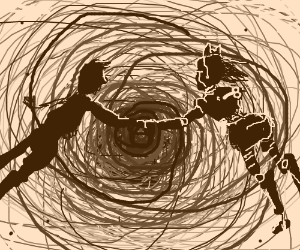

"When a black hole devours a star, it can launch a powerful blast of material outwards that obstructs our view," Samantha Oates, an astronomer at the University of Birmingham, said in a statement. This process is delightfully called spaghettification, but make no mistake: it's gruesome. The flare occurred just 215 million light-years away from Earth, closer than any other previously observed tidal disruption event.Īstronomers have spotted a rare and radiant pulse of light-the last gasp of a dying star that has been sucked toward the center of a supermassive black hole and shredded into sinuous strings of stardust.The TDE is helping scientists understand more about the gruesome spaghettification process.Astronomers have witnessed a tidal disruption event, where a star whose material was shredded by a nearby supermassive black hole releases an bright flash of light.So, if you didn't like your new digs, you could just hop into the next universe over.

#A PERSON GETTING SUCKED INTO A BLACK HOLE FULL#
Though, as Hintz's study concludes, it's possible that the cosmic landscape would be full of wormholes. Of course, what life would be like in the strange and unpredictable world that awaits you on the far side of the Cauchy horizon remains unknowable. Not that you're likely to get sucked into any black hole - theoretical or otherwise - but it's nice to know you might survive the trip. However, as the team points out in their paper, the behavior and makeup of these non-existent electrically-charged black holes could be seen in certain black holes that do exist: rotating ones. The calculations in Hintz's study only work for black holes with an electric charge (which are, as far as we know, wholly theoretical). And if that's the case, then if we ramped up the engine our of spaceship to pass through the Cauchy horizon fast enough, we might actually make it to the other side. Because of this, it stands to reason that all this energy might be more evenly distributed than we think. “ could emit elephants, planets, radiation – basically anything,” Hintz said to New Scientist, which means that even if gravity doesn't tear you limb from limb, you could be taken out by an elephant hurtling toward you at warp speed.īut here's the thing: as Hintz's team points out, the universe is rapidly expanding.

So, not only do we have no idea might be lurking within, we also can't make any predictions. But at the edge of the Cauchy horizon, on the brink of singularity, the laws of physics don't apply. Here on Earth, if we want to better understand our current circumstances, or attempt to make guesses about the future, we can look to the past. However, during that period space-time will also be stretching the bounds of what makes sense what the philosophers called determinism. What we do know for certain is that if you spend too long near the Cauchy horizon - deliberating the senselessness of deep space, perhaps - gravity will stretch you to death. More interesting than what might exist beyond the Cauchy horizon is what doesn't - namely, the governing principles of thought and logic that allow us to make sense of the world and predict with a fair degree of certainty how scenarios will play out. “Given that we don’t know what happens past the Cauchy horizon, it could be crazy things as long as they’re mathematically possible,” Hintz told New Scientist. Which is why Hintz and his team were so curious about it. In the case that you were sucked into a black hole that had an electromagnetic charge, once you made it into the event horizon, you'd actually find yourself confronted by something else entirely: the Cauchy horizon.

Should you find yourself in a black hole, the event horizon would be the "point of no return" if you passed through it. Am I going to get sucked into a black hole We are in absolutely no danger from black holes. All black holes have what's called an event horizon. Credit: Paul Cornish with Bruce McCandless image by NASA. Before launching into their findings, let's recall that, theoretically, some black holes have an electromagnetic charge and some don't.


 0 kommentar(er)
0 kommentar(er)
